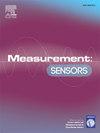A fusion positioning system with environmental-adaptive algorithm: IPSO-IAUKF fusion of UWB and IMU for NLOS noise mitigation
Q4 Engineering
引用次数: 0
Abstract
Accurate positioning in non-line-of-sight (NLOS) scenarios persists as a critical challenge for ultra-wideband (UWB) systems. This paper proposes a collaborative positioning framework that integrates an inertial measurement unit (IMU). An improved particle swarm optimization and adaptive unscented Kalman filter (IPSO-IAUKF) algorithm based on environmental assessment is also designed. The threefold contributions include: (1) A tightly coupled positioning system architecture is constructed by deeply integrating UWB ranging with IMU motion measurements; (2) An improved particle swarm optimization (IPSO) algorithm is proposed to optimize the initial coordinate estimation of UWB using a dynamic inertia weight strategy; (3) An adaptive Unscented Kalman Filter (UKF) framework is designed, incorporating an environmental state discrimination threshold and a real-time noise matrix update mechanism to dynamically optimize the covariance matrix, thereby enhancing positioning robustness in complex noise environments. Multi-scenario trajectory simulations and practical experiments are conducted based on the established positioning model. Numerical simulation results demonstrate that the proposed fusion framework achieves a 52.6 % improvement in positioning accuracy compared to standalone UWB solutions, with a 44.6 % enhancement in noise resistance under NLOS interference compared to traditional fusion algorithms. Further practical tests reveal that the IPSO-IAUKF algorithm achieves average positioning accuracy improvements of 52.1 %, 45.5 %, and 46.0 % in two typical noise environments compared to conventional UKF and algorithms 1 and 2 used in this paper, respectively, while the maximum positioning error decreases by 44.6 %, 23.9 %, and 29.7 %, respectively. These results verify the superiority of this method in complex scenarios.
一种基于环境自适应算法的融合定位系统:基于超宽带和IMU的IPSO-IAUKF融合NLOS噪声抑制
在非视距(NLOS)场景下的精确定位一直是超宽带(UWB)系统面临的关键挑战。提出了一种集成惯性测量单元(IMU)的协同定位框架。设计了一种基于环境评价的改进粒子群优化和自适应无气味卡尔曼滤波(IPSO-IAUKF)算法。主要贡献包括:(1)将超宽带测距与IMU运动测量深度集成,构建了紧密耦合的定位系统架构;(2)提出了一种改进的粒子群算法(IPSO),利用动态惯性权重策略对超宽带初始坐标估计进行优化;(3)设计了自适应Unscented卡尔曼滤波(UKF)框架,结合环境状态判别阈值和实时噪声矩阵更新机制,动态优化协方差矩阵,增强了定位在复杂噪声环境下的鲁棒性。基于建立的定位模型,进行了多场景弹道仿真和实际实验。数值仿真结果表明,与独立的UWB解决方案相比,该融合框架的定位精度提高了52.6%,在NLOS干扰下的抗噪声能力比传统融合算法提高了44.6%。进一步的实际测试表明,IPSO-IAUKF算法在两种典型噪声环境下的平均定位精度分别比传统UKF算法和本文所采用的算法1和算法2提高了52.1%、45.5%和46.0%,最大定位误差分别降低了44.6%、23.9%和29.7%。这些结果验证了该方法在复杂场景下的优越性。
本文章由计算机程序翻译,如有差异,请以英文原文为准。
求助全文
约1分钟内获得全文
求助全文
来源期刊

Measurement Sensors
Engineering-Industrial and Manufacturing Engineering
CiteScore
3.10
自引率
0.00%
发文量
184
审稿时长
56 days
 求助内容:
求助内容: 应助结果提醒方式:
应助结果提醒方式:


